Daily Vocabulary Words: List of Daily Used Words in Leading Indian Newspapers
Hi there. Welcome to this special section @ Wordpandit. Our endeavour here is straightforward: highlighting daily vocabulary words that you would come across in leading newspapers in the country. We have included the following newspapers in our selection:
• The Times of India
• The Economic Times
• Hindustan Times
• Mint
• Indian Express
We are putting in extensive work to develop your vocabulary. All you have to do is be regular with this section and check out this post daily. This is your repository of commonly used words; essentially, we are posting a list of daily used words. Hence, this has significant practical application as it teaches you words that are commonly used in leading publications mentioned above.
Visit the website daily to learn words from leading Indian newspapers.
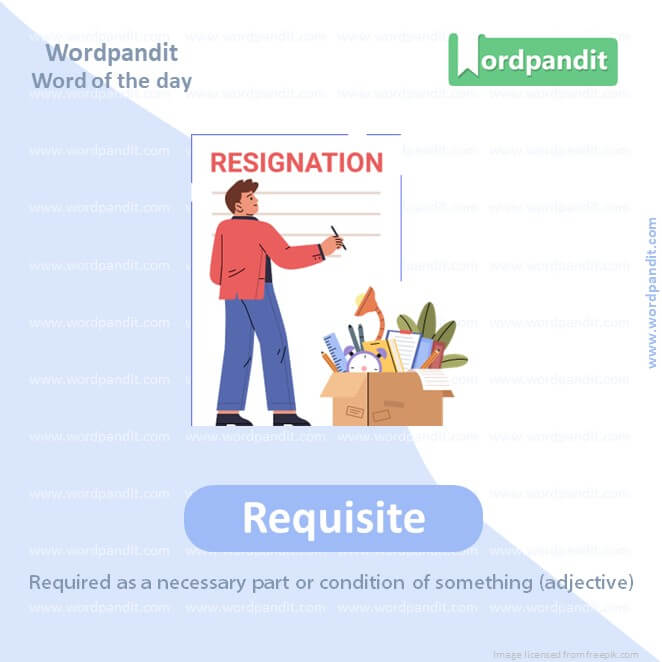
WORD-1: Requisite
CONTEXT: The fact is that, today, neither the CGWB nor any other institution, Centre or state, has the requisite technical knowhow.
SOURCE: Indian express
EXPLANATORY PARAGRAPH: Imagine baking cookies and realizing you need flour to make the dough stick together. That’s like something being “requisite.” It means something that’s needed or necessary for a particular purpose, like having a pencil to write or wearing shoes to protect your feet when you go outside.
MEANING: Required or necessary part or condition of something (adjective).
PRONUNCIATION: REK-wuh-zit
SYNONYMS: necessary, essential, required, needed, mandatory, indispensable
USAGE EXAMPLES:
1. The requisite qualifications for the job included a college degree and relevant experience.
2. She lacked the requisite skills to complete the task effectively.
3. The safety equipment is requisite for anyone working in the lab.
4. The company provided all the requisite resources for the project.
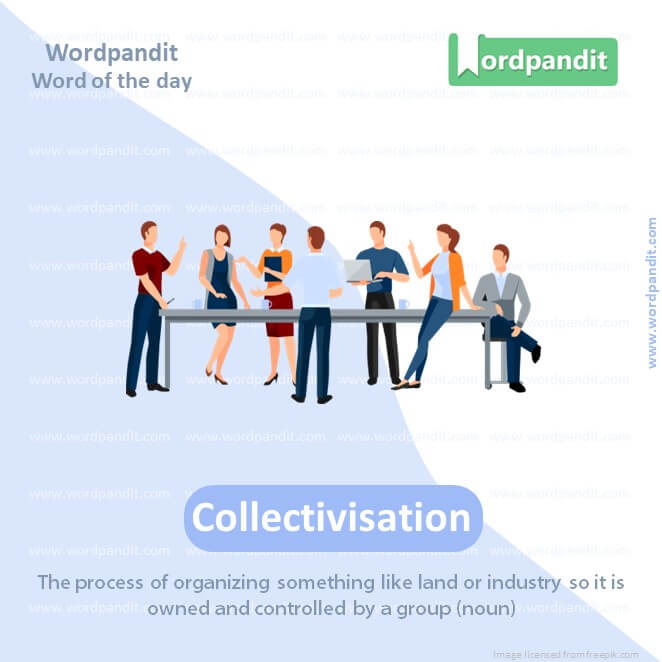
WORD-2: Collectivisation
CONTEXT: Such collectivisation is a political process which should begin with a factual study and report.
SOURCE: Indian express
EXPLANATORY PARAGRAPH: Imagine sharing your toys with your friends and playing together to build a big toy castle. That’s like “collectivization.” It means bringing things together and sharing them as a group, like farmers pooling their crops to sell or workers joining together to share resources.
MEANING: The process of organizing something like land or industry so it is owned and controlled by a group (noun).
PRONUNCIATION: kuh-lek-tuh-vuh-zey-shuhn
SYNONYMS: communalization, cooperation, collaboration, consolidation, aggregation, unification
USAGE EXAMPLES:
1. The government promoted collectivization of agriculture to increase efficiency.
2. The collectivization of resources helped small businesses compete with larger corporations.
3. The company’s collectivization efforts resulted in higher productivity and profits.
4. The collectivization of wealth is a central theme in some political ideologies.
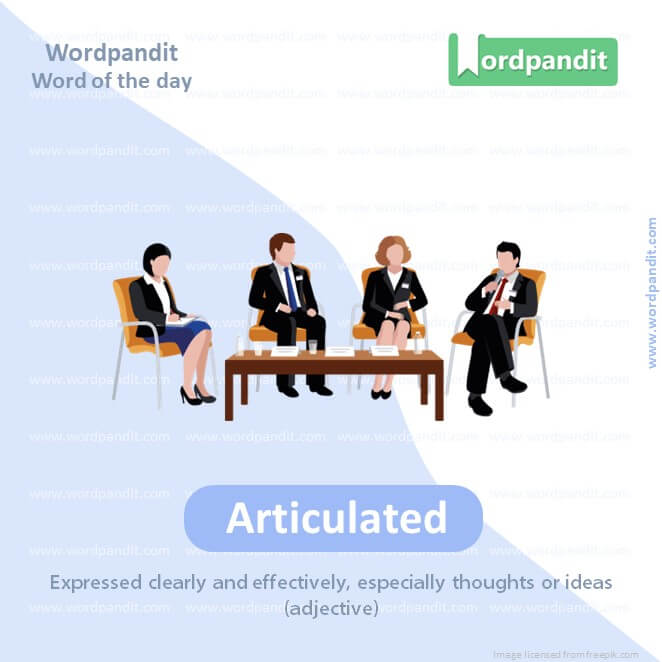
WORD-3: Articulated
CONTEXT: these core developmental problems are not articulated at the hustings doesn’t mean that they don’t exist.
SOURCE: Indian express
EXPLANATORY PARAGRAPH: Imagine putting together a puzzle and carefully fitting each piece into its proper place. That’s like something being “articulated.” It means being expressed clearly and coherently, like explaining your thoughts in a way that others can understand or pronouncing each word clearly when speaking.
MEANING: Expressed clearly and effectively, especially thoughts or ideas (adjective/verb).
PRONUNCIATION: ahr-TIK-yuh-ley-tid
SYNONYMS: expressed, formulated, communicated, enunciated, pronounced, eloquent
USAGE EXAMPLES:
1. She articulated her ideas in a well-organized presentation.
2. The politician articulated her stance on the issue during the debate.
3. He struggled to articulate his thoughts under pressure.
4. The professor articulated the complex theories in a way that students could understand.
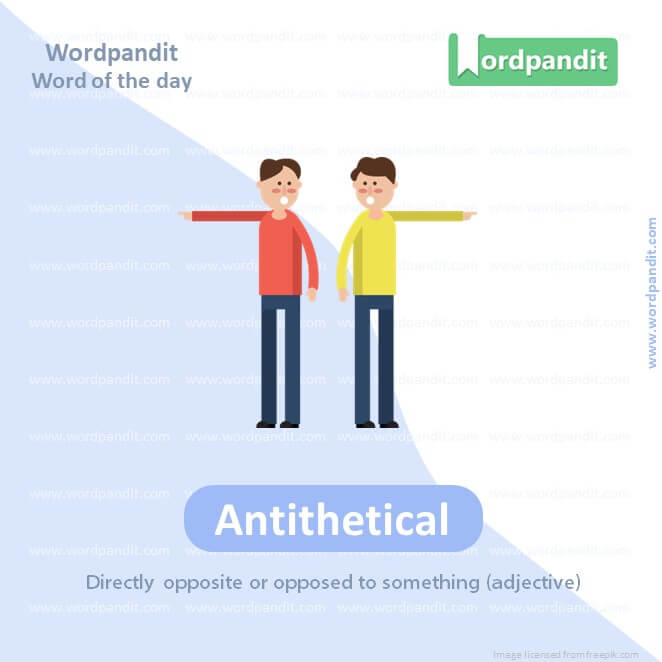
WORD-4: Antithetical
CONTEXT: the people themselves need to comprehend the issues involved. A centralised science, as we have, is antithetical to this.
SOURCE: Indian express
EXPLANATORY PARAGRAPH: Imagine one friend saying they want to play outside and another friend saying they want to stay inside and read. That’s like something being “antithetical.” It means being completely opposite or contradictory to something else, like hot and cold or day and night.
MEANING: Directly opposite or opposed to something (adjective).
PRONUNCIATION: an-tuh-THEH-ti-kuhl
SYNONYMS: contradictory, opposite, contrary, conflicting, opposed, contrasting
USAGE EXAMPLES:
1. The company’s values were antithetical to her personal beliefs.
2. The politician’s views were antithetical to the majority of voters in the district.
3. His actions were antithetical to the principles of democracy.
4. The two theories presented were antithetical to each other.
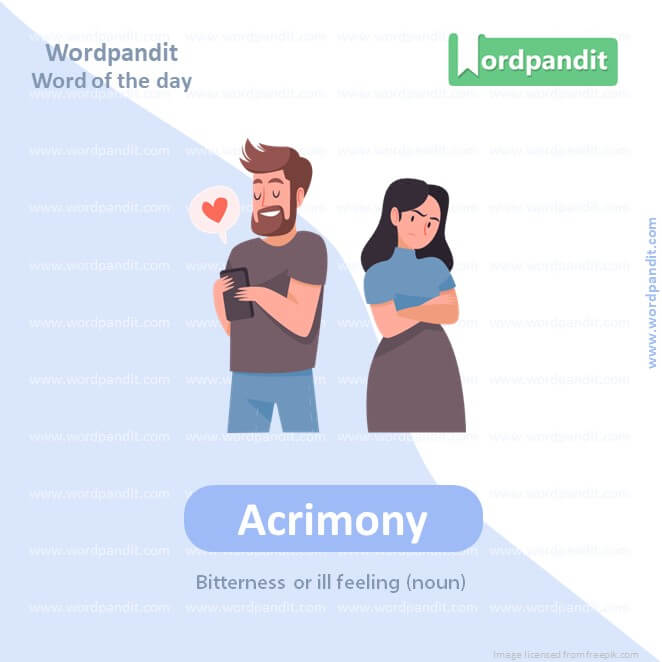
WORD-5: Acrimony
CONTEXT: This causes much acrimony and a loss of focus on serious matters of development.
SOURCE: Indian express
EXPLANATORY PARAGRAPH: Imagine two friends having an argument and shouting at each other, with neither wanting to apologize first. That’s like “acrimony.” It means having strong feelings of anger or bitterness towards someone, like feeling upset because a friend didn’t invite you to their birthday party or being mad because someone broke a promise.
MEANING: Bitterness or ill feeling (noun).
PRONUNCIATION: AK-ruh-moh-nee
SYNONYMS: bitterness, animosity, hostility, resentment, rancor, animus
USAGE EXAMPLES:
1. The divorce proceedings were marked by acrimony and disputes over assets.
2. There was acrimony between the two political parties during the debate.
3. The business partners parted ways with acrimony after a disagreement.
4. Acrimony between neighbors escalated into a legal dispute.
WORD-6: Homogenisation
CONTEXT: It may well be that excessive centralisation and homogenisation in a diverse country such as ours is making governance difficult.
SOURCE: Indian express
EXPLANATORY PARAGRAPH: Imagine mixing different colors of paint together until they all become the same shade of gray. That’s like “homogenization.” It means making things more similar or uniform, like blending different types of milk together to make them all the same or standardizing language so everyone speaks the same way.
MEANING: The process of making things uniform or similar, especially by blending or standardizing them (noun).
PRONUNCIATION: hoh-muh-juh-nuh-ZEY-shuhn
SYNONYMS: standardization, uniformity, assimilation, blending, equalization, integration
USAGE EXAMPLES:
1. The homogenization of cultures led to a loss of diversity.
2. The company implemented a policy of homogenization to streamline operations.
3. The homogenization of milk ensures consistency in quality.
4. Globalization has contributed to the homogenization of consumer tastes.
WORD-7: Incessantly
CONTEXT: Time’s healing power is truth, which triumphs over the arrogance of falsehood. Justice struggles incessantly against injustice, and emerges victorious.
SOURCE: Indian express
EXPLANATORY PARAGRAPH: Imagine a toy robot that keeps repeating the same word over and over without stopping. That’s like something happening “incessantly.” It means continuing without pause or interruption, like a dripping faucet that won’t stop or a dog barking all night long.
MEANING: Continuing without interruption; constantly or unceasingly (adverb).
PRONUNCIATION: in-SES-uhnt-lee
SYNONYMS: constantly, continually, perpetually, persistently, unceasingly, unremittingly
USAGE EXAMPLES:
1. The baby cried incessantly throughout the night.
2. The neighbor’s dog barked incessantly, keeping everyone awake.
3. The rain fell incessantly for days, causing flooding in the area.
4. She talked incessantly, barely pausing for breath.
WORD-8: Reconciliation
CONTEXT: Justice struggles incessantly against injustice, and emerges victorious. War submits to peace. Construction follows destruction, and reconciliation replaces rancour.
SOURCE: Indian express
EXPLANATORY PARAGRAPH: Imagine two friends who had a big argument but then apologized and hugged each other. That’s like “reconciliation.” It means making up or restoring friendly relations after a disagreement or conflict, like saying sorry to your sibling after fighting over a toy.
MEANING: The restoration of friendly relations; the action of making one view or belief compatible with another (noun).
PRONUNCIATION: rek-uhn-suh-LEE-ay-shuhn
SYNONYMS: resolution, settlement, agreement, understanding, compromise, conciliation
USAGE EXAMPLES:
1. The couple sought counseling to facilitate reconciliation after their disagreement.
2. The treaty marked a significant step toward reconciliation between the two countries.
3. Reconciliation between the feuding factions seemed unlikely at first.
4. The church emphasized the importance of reconciliation and forgiveness.
WORD-9: Rancour
CONTEXT: Justice struggles incessantly against injustice, and emerges victorious. War submits to peace. Construction follows destruction, and reconciliation replaces rancour.
SOURCE: Indian express
EXPLANATORY PARAGRAPH: Imagine feeling really mad at someone because they said something mean about you to your friends. That’s like “rancor.” It means having strong feelings of bitterness or resentment towards someone, like feeling upset because a friend didn’t invite you to their birthday party or being mad because someone broke a promise.
MEANING: Bitterness or resentfulness, especially when long-standing or intense; deep-seated ill will or resentment (noun).
PRONUNCIATION: RANG-ker
SYNONYMS: bitterness, animosity, hostility, resentment, acrimony, enmity
USAGE EXAMPLES:
1. Despite their attempts at reconciliation, there was still underlying rancor between them.
2. The political campaign was marked by rancor and personal attacks.
3. The siblings’ rivalry was fueled by years of rancor and jealousy.
4. She couldn’t let go of the rancor she felt toward her former friend.
WORD-10: Enchanting
CONTEXT: When that happens, battlefields make way for schools, universities, hi-tech industries, verdant rice fields, sports stadiums, bustling markets, and enchanting tourist resorts.
SOURCE: Indian express
EXPLANATORY PARAGRAPH: Imagine watching a magic show with tricks that make you feel like you’re in a fairy tale. That’s like something being “enchanting.” It means having a magical or captivating quality that makes you feel happy or fascinated, like reading a storybook with beautiful illustrations or listening to a song that makes you want to dance.
MEANING: Delightfully charming or captivating, as if by magic or enchantment (adjective).
PRONUNCIATION: en-CHANT-ing
SYNONYMS: captivating, charming, delightful, magical, bewitching, entrancing
USAGE EXAMPLES:
1. The enchanting melody of the music filled the room with joy.
2. The children were captivated by the enchanting fairy tale.
3. She found the garden to be an enchanting place filled with colorful flowers.
4. The movie transported audiences to an enchanting world of fantasy and wonder.
Vocabulary Hard Words
The experience of unraveling the depths of language learning often leads us to ‘vocabulary hard words’. These challenging jargons might seem daunting initially, but with the right learning strategies, the enigma of ‘vocabulary hard words’ can turn into an enticing quest. But how can these ‘vocabulary hard words’ be learned effectively?
Firstly, to master ‘vocabulary hard words’, it’s vital to break down the process into manageable steps. Instead of tackling several words at once, focus on understanding a few each day. This gradual approach ensures effective retention and understanding.
Multimedia resources tremendously aid in comprehending ‘vocabulary hard words’. Movies, podcasts, or even music in the target language contribute a comprehensive perspective. They provide real-life contexts and usages of ‘vocabulary hard words’, making them more understandable and less intimidating.
The incorporation of memory-enhancing techniques, such as flashcards or digital apps, can significantly bolster the retention of ‘vocabulary hard words’. Such tools encourage active recall, helping to cement these words into your long-term memory. Mnemonic devices can also aid in making these words more approachable by associating the hard words with relatable images or stories.
Practice is decisive when learning ‘vocabulary hard words’. Using these words in your conversations, written communications, or even social media posts will facilitate a robust understanding and recall.
Finally, do not worry about making mistakes while using ‘vocabulary hard words’. Mistakes are essential stepping stones in the learning process. They provide insights into areas that need more focus and help refine your grasp over these words.
In conclusion, grasping ‘vocabulary hard words’ is undoubtedly a challenging task but not an insurmountable one. With the aid of effective strategies including graded learning, multimedia resources, memory-enhancing tools, and regular practice, the process of mastering ‘vocabulary hard words’ can become an engaging and rewarding journey.










